Cold weather chickens - 8 things NOT to do to in winter
Back to blog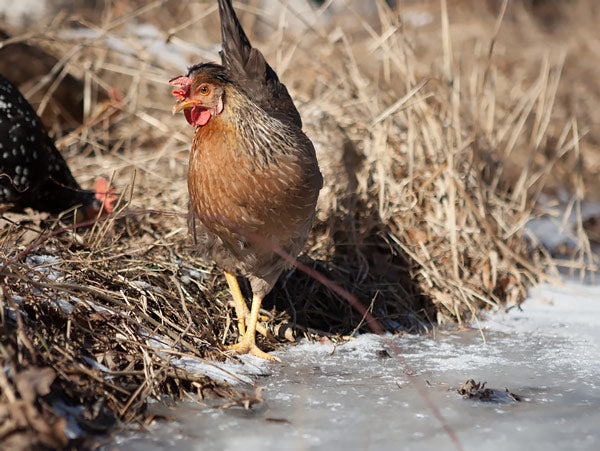
How to prepare your chickens for winter isn't especially intuitive. In fact, many people may take steps that can actually make things more difficult for their flock rather than helping them to become cold weather chickens! Choosing cold-hardy breeds (if you live in an area of cold winters) is certainly an important first step! But presuming you've already made good breed choices, you'll also want to know what NOT to do for your cold-weather chickens.
Cold weather chickens - 8 things NOT to do to in winter
1. Don't keep your chickens closed up in their coop when it's cold.
Good cold weather chickens can be allowed to decide when they want to stay in or come out. You might think that your chickens won't want to go outside in the snow, and sometimes that's true. Some of your chickens will hate it, and will stay inside most of the day, but others won't mind it at all.
The only time I keep the coop door closed during the day is when the snow is too deep for my cold weather chickens to walk in, or when it's just so bitter and windy I know no one will come out. (And even then, I sometimes open the door just in case).
2. Don't tightly insulate your coop.
I know that seems strange, but it's true--tightly insulated coops can cause more harm than good. If your coop is tightly insulated, not only will it retain heat, it will also retain moisture... and retaining moisture in the coop is very, very bad.
Chickens create a lot of moisture from their respirations. A lot of moisture also evaporates from their droppings. And in winter, they'll be spending more time inside, even if just because of the longer winter nights! More droppings build-up---and more moisture. And the problem is that lot of moisture in the air can condense, freeze, and contribute to frostbite. All that humidity also increases the risk of unhealthy conditions in the coop leading to respiratory ailments and mold-related illnesses. Plus, poor ventilation can also cause ammonia gas to build up inside your coop, which is damaging to your chickens' lungs.
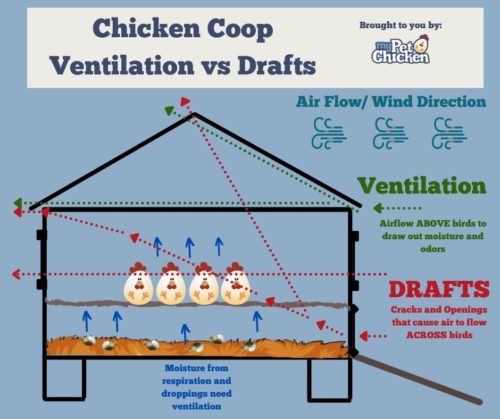
You can have some insulation in cold areas, but remember that cold weather chickens need a coop to be well ventilated, to avoid moisture build-up, but not drafty.
3. Don't assume you need to heat your coop
This is another piece of advice that seems completely counter-intuitive...however it's good advice for a number of reasons, unless you live in a region that regularly drops below twenty degrees outside.
Chickens adapt to lower temperatures over time. If the coop is heated, they'll never become real cold weather chickens; they'll never get used to the cold winter temperatures outside. Then, if you lose power and their heat goes out, the sudden sharp drop in temperatures with no time to acclimate means you could lose your whole flock in one terrible, fell swoop.
Even if it doesn't come to that, if your chickens are hesitant to spend time outside, they will spend even more time inside the coop making the air wet and breathing the unhealthy, moist air. Finally, heating the coop is a fire hazard if you're using an infrared heat bulb (they can get up to 435 degrees!)
You might heat your coop during sudden, precipitous drops in temperature, just to help ease the transition for my cold weather chickens , or when the temperatures are below zero for extended periods. If you live in an area where you have to heat your coop, consider getting a backup generator so you don't lose birds during a loss of power.
You might also choose a heater like the Cozy Coop Heater or Sweeter Heater, which don't heat your whole coop, but rather take the edge off when your chicken cozies right up next to it for a reprieve.
4. Don't forget to gather eggs more often than usual.
If you have cold weather chickens, some may continue to lay during the winter, and the eggs could freeze. While this doesn't really hurt them, you can't then eat the eggs because they're at high risk for bacterial contamination. What happens is that the frozen egg contents expand, and can create tiny hairline cracks in the shell you might not see with the naked eye. The cracks can let bacteria into the shell. Of course, at cold temperatures, the bacteria doesn't grow very quickly, but nonetheless, keeping cracked eggs is just not a good idea.
Plus, there's nothing like opening your refrigerator to find that an egg has thawed and seeped out all over everything---ugh, what a mess!

5. Don't let your water freeze.
Keeping fresh, unfrozen water for your flock in the winter can be a challenge. There are always the heated waterers to keep your water from freezing.
Another option is to use multiple waterers. In the morning, bring in a fresh waterer, and bring in the waterer that was in the coop overnight, and is now frozen. By the time that one is thawed, the other one is nearly frozen, so I switch them out.
6. Don't put off coop cleaning.
Because your cold-weather chickens will be spending more time inside and creating more droppings inside as a result, the coop will need cleaning more often. Many of us here at My Pet Chicken like to use the deep litter method for managing my coop rather than frequent cleanings, but even doing that, new bedding needs to be added more frequently in the winter to make sure everything stays dry and cozy.
7. Don't let your birds get too bored.
If they have a very small coop and run, there may not be a whole lot to entertain your flock like there is during warmer months. When snow is on the ground, there will be little or no sunbathing. With the ground frozen, dust bathing is unlikely. There won't be lots of bugs to catch or greens to forage. Bored birds may become snippy or even aggressive with one another if there isn't anything to think about or do other than reinforce the pecking order over and over again.
Alleviate some of the boredom for your cold-weather chickens by adding treats to their area. For instance, hang a head of cabbage in your coop for your girls to peck at. As they peck, it swings, making it more difficult to eat immediately, and keeping them entertained for hours. There are other treats that work well for entertainment too like high protein Treat Square Cakes designed for chickens and other domestic poultry. In winter, something with high fat (including scratch or cracked corn) gives them the extra calories they need to help stay warm. You can also simply scatter some scratch inside the run for them to forage for. That'll keep them entertained, too.
8. Don't skimp on the grit.
Chickens pick up grit naturally from small pebbles they ingest while foraging around, scratching through the dirt in search of morsels to eat. The grit acts like "teeth" to help their gizzard "chew" their food. In winter, however, the ground may be frozen and too hard for a bird to dislodge any pieces to pick up grit naturally. In this case, it's wise to make sure your birds have plenty of supplemental grit to help them digest their feed. Your flock will thank you for providing this digestive assistance on those cold winter days!
Do you have any other suggestions for preparing your cold-weather chickens for winter? Please share below in the comments!
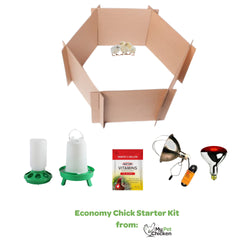
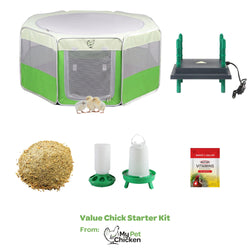
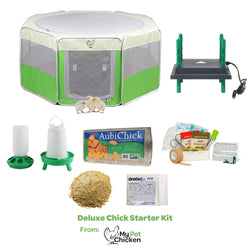
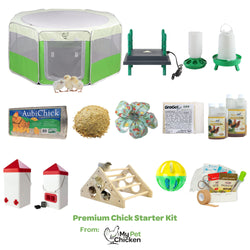
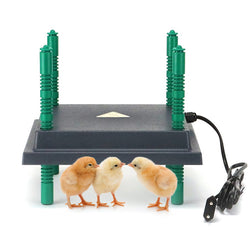
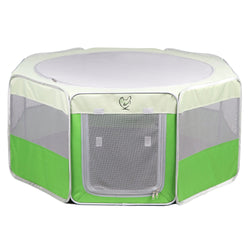
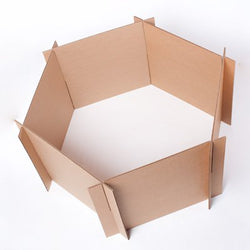
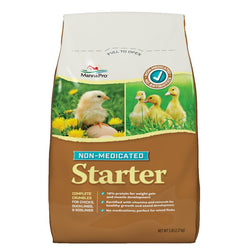
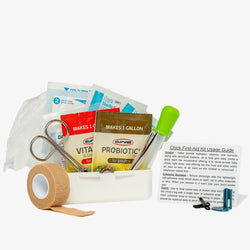
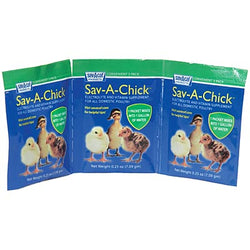
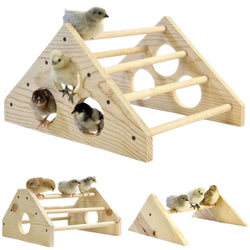
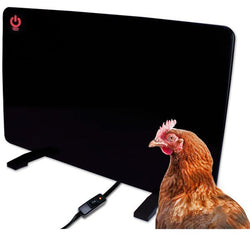
7 comments
I have a pen enclosed with chicken wire and a coup at the end. In winter I have cloth tarps hung on the outside of the pen with a roof over the entire area. I have roosts in the pen as well as the coup, so they can roost in the coup or pen. In winter I put heated waters in the pen. Their feed hangs from top of pen. The door to the pen has an automatic opener so they can go out or stay inside. I put grains in pans on the ground.
I put a greenhouse roof over the run an tarped off the edges of the run. I did insulate the coop pretty well but I have vents installed and I keep it pretty clean. I have a 5 gallon waterer and a water heater under it in a corner of the run where its tarped off. So far with Temps in the 20s it hasn’t frozen. I’ll look into putting some hay down to protect their feet. Snow shouldn’t be able to get in but it is probably a good idea. What is supplemental grit?
We live in upper central Minnesota where the temps can and do reach about -35. This will be our second year with our girls and the second year of being chicken parents. We insulate the coop at night by adding cut out foam to the vents at the top of the coop. There is still enough space to allow for air movement and there is a window in the coop which also helps with circulation. We tried a water heater but it just doesn’t work when temps are below 20. I refuse to put the waterer inside the coop because they spill it and the bedding gets wet which creates a moisture issue. This year, we bought a 1.5 gallon heated water bowl. Fingers crossed! We tarp half of the coop and add hay to the ground to protect their feet. It’s degradable and we take it out at the end of the winter. It also helps to absorb the water when the snow melts too. Our chickens refuse to walk on snow! We added two wall panel heaters and will turn one on during the day when it’s below 20 and both on at night when it’s below zero. We have not had any issues with moisture in the coop because of it. As an added measure, I use Vaseline to coat their waddles and combs about once every 2-3 weeks which seems to help keep the frostbite at bay.
I am down to a single chicken:( we live in Minnesota so the coop is heated but I worry about her being lonely. during the winter the only time she will see anyone is when we open/close the door…..any suggestions?
Hello, I live in Michigan and I keep my water outside in the run with a heater under it. I put tarps up around half of the run to cut down on the wind. If snow does blow in the run I shovel it out of the way because my girls do not like to walk in the snow. If it is below zero for an extended period I do move the water inside and close the door but I don’t like to do that because they will always spill water and then you have wet bedding. I think its best to keep the water out of the coop.